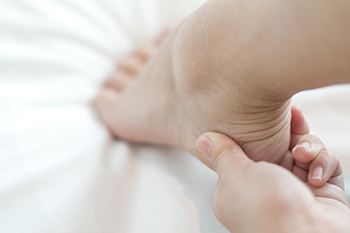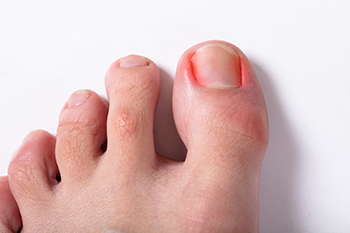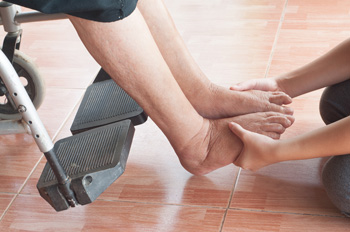Connect With Us
Blog
Items filtered by date: December 2021
Why Foot Care Is Important for People with Diabetes
People with diabetes can often lose feeling in their feet and the ability to heal ordinary cuts, abrasions or pressure points. This can lead to the development of non-healing wounds and far more serious complications. Foot care can help the diabetic keep their feet healthy and protected. The best way for diabetics to take care of their feet is by wearing quality shoes that fit perfectly and refraining from going barefoot — even in the house. Daily foot inspections are also a must in order to spot anything unusual. If any abrasion, discoloration, redness or purple area is detected, it is suggested that you seek the treatment of a podiatrist as soon as possible to avoid it festering and turning into a wound. For detailed information on diabetic foot care as well as regular foot checkups, please schedule an appointment with a podiatrist.
Diabetic foot care is important in preventing foot ailments such as ulcers. If you are suffering from diabetes or have any other concerns about your feet, contact one of our podiatrists from Crosstown Podiatry. Our doctors can provide the care you need to keep you pain-free and on your feet.
Diabetic Foot Care
Diabetes affects millions of people every year. The condition can damage blood vessels in many parts of the body, especially the feet. Because of this, taking care of your feet is essential if you have diabetes, and having a podiatrist help monitor your foot health is highly recommended.
The Importance of Caring for Your Feet
- Routinely inspect your feet for bruises or sores.
- Wear socks that fit your feet comfortably.
- Wear comfortable shoes that provide adequate support.
Patients with diabetes should have their doctor monitor their blood levels, as blood sugar levels play such a huge role in diabetic care. Monitoring these levels on a regular basis is highly advised.
It is always best to inform your healthcare professional of any concerns you may have regarding your feet, especially for diabetic patients. Early treatment and routine foot examinations are keys to maintaining proper health, especially because severe complications can arise if proper treatment is not applied.
If you have any questions please feel free to contact our offices located in Wayne, Montclair, and Randolph, NJ . We offer the newest diagnostic and treatment technologies for all your foot and ankle needs.
Is Your Child Suffering From Sever’s Disease?
 Sever’s disease is a common cause of heel pain in youth who are in their growth spurt between the ages of 8 and 14. Sever’s disease is caused when the Achilles tendon, which connects the calf muscle to the heel, doesn’t grow as fast as the bones in the calves. This causes the tendon to pull up on the heel, resulting in pain. Symptoms of Sever’s disease include heel pain when or after exercising, limping, and tiptoeing. While Sever’s disease often gets better over time, there are treatment options for the pain such as ice, load management, medicine or even orthotics. Because of this, if your child is complaining of heel pain that may be Sever’s disease, it would be wise to consult with a podiatrist.
Sever’s disease is a common cause of heel pain in youth who are in their growth spurt between the ages of 8 and 14. Sever’s disease is caused when the Achilles tendon, which connects the calf muscle to the heel, doesn’t grow as fast as the bones in the calves. This causes the tendon to pull up on the heel, resulting in pain. Symptoms of Sever’s disease include heel pain when or after exercising, limping, and tiptoeing. While Sever’s disease often gets better over time, there are treatment options for the pain such as ice, load management, medicine or even orthotics. Because of this, if your child is complaining of heel pain that may be Sever’s disease, it would be wise to consult with a podiatrist.
Sever's disease often occurs in children and teens. If your child is experiencing foot or ankle pain, see one of our podiatrists from Crosstown Podiatry. Our doctors can treat your child’s foot and ankle needs.
Sever’s Disease
Sever’s disease is also known as calcaneal apophysitis, which is a medical condition that causes heel pain I none or both feet. The disease is known to affect children between the ages of 8 and 14.
Sever’s disease occurs when part of the child’s heel known as the growth plate (calcaneal epiphysis) is attached to the Achilles tendon. This area can suffer injury when the muscles and tendons of the growing foot do not keep pace with bone growth. Therefore, the constant pain which one experiences at the back of the heel will make the child unable to put any weight on the heel. The child is then forced to walk on their toes.
Symptoms
Acute pain – Pain associated with Sever’s disease is usually felt in the heel when the child engages in physical activity such as walking, jumping and or running.
Highly active – Children who are very active are among the most susceptible in experiencing Sever’s disease, because of the stress and tension placed on their feet.
If you have any questions, please feel free to contact our offices located in Wayne, Montclair, and Randolph, NJ . We offer the newest diagnostic and treatment technologies for all your foot and ankle injuries.
What Can I Do About Ingrown Toenails?
 Ingrown toenails can cause a great deal of pain and far more serious problems, especially if left untreated. Ingrown toenails can develop when the edge of the nail grows into the surrounding skin of the toe. Common causes can include wearing tight shoes or socks that increase pressure on the big toe, and activities that overuse the toes, like football, soccer, or ballet. The most common symptoms are pain when you touch your big toe or put on your shoes, and a buildup of fluid around the affected toenail. Soaking the feet for 20 minutes several times a day can help, but feet should be kept clean and dry as much as possible afterward. Wear shoes that have more room in the toe box and cease any activities that aggravate the condition. If your toe becomes infected – indicated by increased pain, redness, swelling or pus – it is suggested that you seek medical treatment options from a podiatrist as soon as possible.
Ingrown toenails can cause a great deal of pain and far more serious problems, especially if left untreated. Ingrown toenails can develop when the edge of the nail grows into the surrounding skin of the toe. Common causes can include wearing tight shoes or socks that increase pressure on the big toe, and activities that overuse the toes, like football, soccer, or ballet. The most common symptoms are pain when you touch your big toe or put on your shoes, and a buildup of fluid around the affected toenail. Soaking the feet for 20 minutes several times a day can help, but feet should be kept clean and dry as much as possible afterward. Wear shoes that have more room in the toe box and cease any activities that aggravate the condition. If your toe becomes infected – indicated by increased pain, redness, swelling or pus – it is suggested that you seek medical treatment options from a podiatrist as soon as possible.
Ingrown toenails can become painful if they are not treated properly. For more information about ingrown toenails, contact one of our podiatrists of Crosstown Podiatry. Our doctors can provide the care you need to keep you pain-free and on your feet.
Ingrown Toenails
Ingrown toenails occur when a toenail grows sideways into the bed of the nail, causing pain, swelling, and possibly infection.
Causes
- Bacterial infections
- Improper nail cutting such as cutting it too short or not straight across
- Trauma to the toe, such as stubbing, which causes the nail to grow back irregularly
- Ill-fitting shoes that bunch the toes too close together
- Genetic predisposition
Prevention
Because ingrown toenails are not something found outside of shoe-wearing cultures, going barefoot as often as possible will decrease the likeliness of developing ingrown toenails. Wearing proper fitting shoes and using proper cutting techniques will also help decrease your risk of developing ingrown toenails.
Treatment
Ingrown toenails are a very treatable foot condition. In minor cases, soaking the affected area in salt or antibacterial soaps will not only help with the ingrown nail itself, but also help prevent any infections from occurring. In more severe cases, surgery is an option. In either case, speaking to your podiatrist about this condition will help you get a better understanding of specific treatment options that are right for you.
If you have any questions please feel free to contact our offices located in Wayne, Montclair, and Randolph, NJ . We offer the newest diagnostic and treatment technologies for all your foot and ankle needs.
Are Bunions Affecting Your Everyday Life?
Obesity and Children’s Foot Health
 It is well known that obesity can affect an adult’s foot health, but did you know that being obese can also impact the health of a child’s feet? Obese children are at an increased risk of developing various foot problems, such as changes in foot biomechanics and walking patterns. Children who are obese tend to put far more load on their metatarsal bones than their healthy weight counterparts. This may increase the risk of foot injuries and acquired flat feet. If your child complains of foot pain, it is suggested that you schedule an appointment with a podiatrist.
It is well known that obesity can affect an adult’s foot health, but did you know that being obese can also impact the health of a child’s feet? Obese children are at an increased risk of developing various foot problems, such as changes in foot biomechanics and walking patterns. Children who are obese tend to put far more load on their metatarsal bones than their healthy weight counterparts. This may increase the risk of foot injuries and acquired flat feet. If your child complains of foot pain, it is suggested that you schedule an appointment with a podiatrist.
Obesity has become very problematic at this point in time and can have extremely negative effects on the feet. If you’re an obese individual and are concerned about your feet, contact one of our podiatrists from Crosstown Podiatry. Our doctors can provide the care you need to keep you pain-free and on your feet.
Obesity and Your Feet
Since your feet are what support your entire weight when standing, any additional weight can result in pain and swelling. Being overweight is one of the main contributors to foot complications.
Problems & Complications
Extra Weight – Even putting on just a few extra pounds could create serious complications for your feet. As your weight increases, your balance and body will shift, creating new stresses on your feet. This uneven weight distribution can cause pain, even while doing the simplest tasks, such as walking.
Diabetes – People who are overweight are at serious risk of developing type-2 diabetes, which has a drastic impact on the health of your feet. As you get older, your diabetes might worsen, which could lead to loss of feeling in your feet, sores, and bruises. You could also become more prone to various infections.
Plantar fasciitis – Pressure and stress that is placed on muscles, joints, and tendons can trigger plantar fasciitis, which is an inflammation of tissue that forms along the bottom of the foot.
If you have any questions please feel free to contact our offices located in Wayne, Montclair, and Randolph, NJ . We offer the newest diagnostic and treatment technologies for all your foot and ankle needs.


